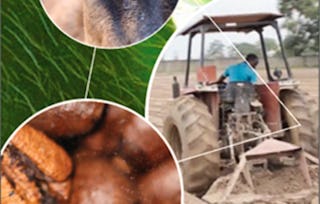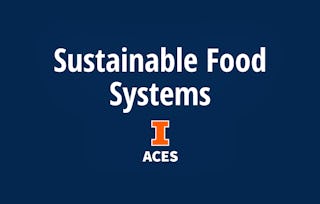This course focuses on the Food-Energy-Water (FEW) nexus as an example of integrated systems thinking in science that can resolve resource gaps and help communities plan for the future. Through a series of four modules, learners will view lectures on the nexus approach, the challenges of climate change to FEW resources, specific challenges and programs from four global locations, and a survey of diverse technologies and solutions that are essential to providing enough food, energy, and water for current and future generations.

Our Global FEWture: Cultivating Food-Energy-Water Solutions
Ends soon: Gain next-level skills with Coursera Plus for $199 (regularly $399). Save now.

Recommended experience
Skills you'll gain
Details to know

Add to your LinkedIn profile
November 2025
See how employees at top companies are mastering in-demand skills

There are 4 modules in this course
This course is all about understanding the ways we can develop efficient and integrated methods for providing three essential resources: food, energy, and water. Considering forecasted increases in population, the need to build a better quality of life in developing countries, and the challenges posed by climate change, this course on FEW systems is a timely, essential inquiry into the science and technology of building community resilience. In this introductory module, UMD Public Health scientists detail the systems thinking behind the food-energy-water nexus. After a historical overview of how past societies have approached water distribution for irrigation, and details of how these resources are interdependent, the lecturers turn to our present challenges and opportunities with FEW resource provision amid ongoing and intensifying climate change.
What's included
8 videos3 assignments1 discussion prompt
This second module deepens our inquiry into how climate change is already challenging agriculture and public health in the developing world, with specific views of agriculture in sub-Saharan Africa, and how snow pack and glacial melt provide essential freshwater for Himalayan and downstream communities. In each case, lecturers provide views of how systems thinking in the FEW nexus helps planning for resources as their supply becomes less predictable.
What's included
4 videos2 assignments
Our third module turns to FEW nexus solutions already at work in four different global locations: Tanzania, Israel, Nepal, and the USA. Our lecturers detail the climate-related challenges in each location. They discuss ways that universities and nonprofits can work together with communities to build FEW capacity and develop education programs that train the next generation of farmers, water managers, and renewable energy experts.
What's included
5 videos2 assignments
Our final module is a detailed exploration of FEW nexus technologies and solutions of today and tomorrow. Each lecturer considers the FEW nexus as a system, where a closed loop allows the most efficient use of waste products to support more resilient foundations for providing clean water, nutritious food, and renewable energy while advancing communities' self-determination.
What's included
8 videos1 reading3 assignments1 discussion prompt
Instructor

Offered by
Explore more from Environmental Science and Sustainability
 Status: Preview
Status: PreviewUniversity of Copenhagen
 Status: Preview
Status: PreviewUniversitat Autònoma de Barcelona
 Status: Free Trial
Status: Free TrialBanco Interamericano de Desarrollo
 Status: Preview
Status: PreviewUniversity of Illinois Urbana-Champaign
Why people choose Coursera for their career




Frequently asked questions
To access the course materials, assignments and to earn a Certificate, you will need to purchase the Certificate experience when you enroll in a course. You can try a Free Trial instead, or apply for Financial Aid. The course may offer 'Full Course, No Certificate' instead. This option lets you see all course materials, submit required assessments, and get a final grade. This also means that you will not be able to purchase a Certificate experience.
When you purchase a Certificate you get access to all course materials, including graded assignments. Upon completing the course, your electronic Certificate will be added to your Accomplishments page - from there, you can print your Certificate or add it to your LinkedIn profile.
Yes. In select learning programs, you can apply for financial aid or a scholarship if you can’t afford the enrollment fee. If fin aid or scholarship is available for your learning program selection, you’ll find a link to apply on the description page.
More questions
Financial aid available,
¹ Some assignments in this course are AI-graded. For these assignments, your data will be used in accordance with Coursera's Privacy Notice.





